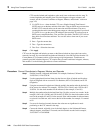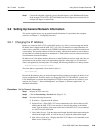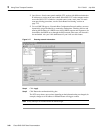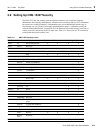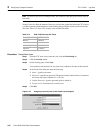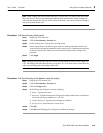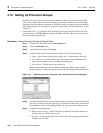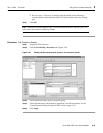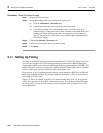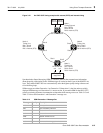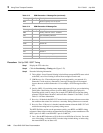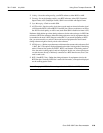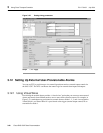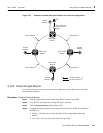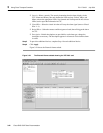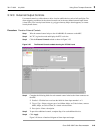
3 Using Cisco Transport Controller 78-11719-02 July 2001
Cisco ONS 15327 User Documentation3-36
Procedure: Delete Protection Groups
Step 1 Display the CTC node view.
Step 2 Verify that working traffic is not running on the protect card:
(a) Click the Maintenance > Protection tabs.
(b) Under Protection Groups, choose the group you want to delete.
(c) Under Selected Group, verify that the protect card is in standby mode. If it is,
continue to Step 3. If the protect card is active, manually switch traffic back to the
working card. Verify that the protect card is in standby mode, then continue to
Step 3. If the protect card is still active, do not continue. Begin troubleshooting or
call technical support.
Step 3 Click the Provisioning > Protection tabs.
Step 4 Under Protection Groups, choose a protection group.
Step 5 Click Delete.
3.11 Setting Up Timing
You must set the SONET timing parameters for each ONS 15327. ONS 15327 timing is set to one
of two modes: external or line. The external node derives its timing from a Building Integrated
Timing Supply (BITS) source wired to the BITS input on the management interface card (MIC). The
BITS source, in turn, derives its timing from a Primary Reference Source (PRS) such as a Stratum
1 clock or GPS signal. The line nodes derive timing from Optical cards.
For protection, up to two additional timing references can be identified: a BITS-level or line-level
source and an internal reference. The internal reference is the Stratum 3 (ST3) clock provided on
every ONS 15327 XTC card.
Figure 3-21 shows an example of an ONS 15327 network timing setup. Node 1 is set to external
timing. Two references are set to BITS, and the third reference is set to internal. The BITS output
pins on the MICs of Node 3 provide timing to outside equipment, such as a Digital Access Line
Access Multiplexer.



